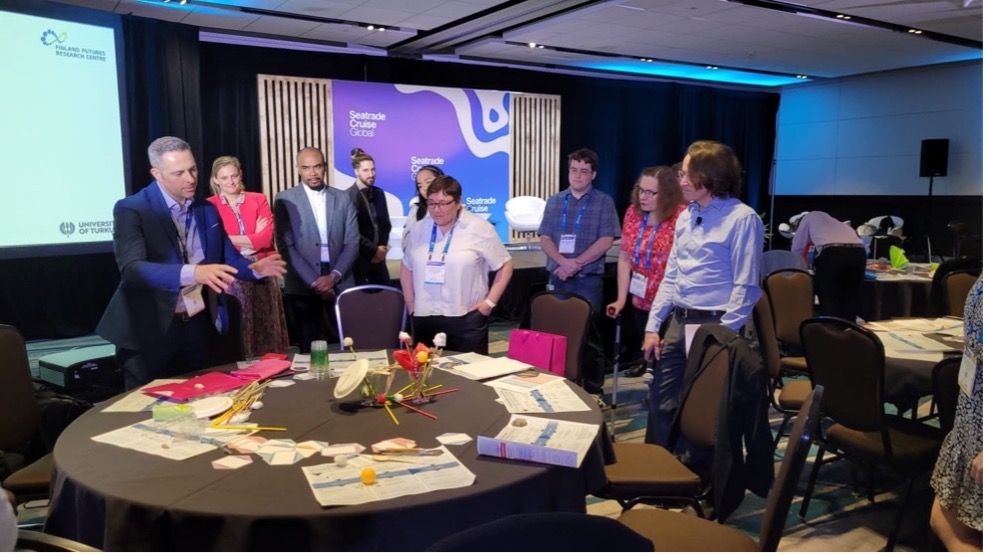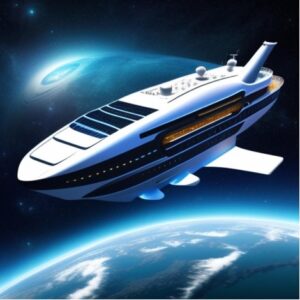This post is about our Director of R&D and business development Mikko’s participation in a workshop “Cruising off the charts” envisioning cruise ships of the future. We attended SeaTrade Cruise Global event in Miami Beach a couple of weeks ago as part of a cluster of Finnish companies researching more environmentally friendly shipbuilding.
The idea of the SusFlow (Sustainability through information flows) research project is to envision the different options and opportunities and identify the challenges that would make a future cruise ship as environmentally friendly as possible. The workshop focused on imagining how a cruise ship would look like in 20 years of time.

In this blog post, we explore the possibilities and challenges of envisioning a climate-neutral future for cruise ships from 5 point of views. Drawing inspiration from nature and technological advancements, we discuss the potential developments in energy efficiency, waste management, and hygiene practices. Additionally, we go into the unforeseen risks and breakthrough technologies that may shape the cruise industry in the coming years. Ultimately, we highlight the importance of embracing change and preparing for a future that prioritizes sustainability.
Five different POVs to environmentally friendly future for cruise ships
1. Nature-Inspired Innovations: As we strive for a more sustainable future, nature-oriented technologies and designs are expected to play a significant role. Examples like Sharklet Technologies, which inhibit bacterial growth, showcase the potential for bio-inspired solutions in the cruise industry. A strong irony lies in looking back the history. We already had the level of climate neutral ships once.
2. Environmental Efficiency: The cruise industry has been actively improving fuel and energy efficiency, as well as waste management and technical maintenance practices. However, the growing size of ships poses challenges in waste production. Future advancements will focus on addressing these issues and optimizing environmental efficiency.
3. The Obvious/Probable Developments: Leaps in technology are expected to enhance shipboard waste and energy efficiency, shore-side sustainability, and cleanliness practices. Innovative solutions like our SmartPipe solutions, which optimize chemical usage onboard, will revolutionize the traditional practices and significantly improve environmental efficiency with machine learning and artificial intelligence. As this technology advances the ships will be able to exchange information through their own network and utilize that information for further optimizing the overall operation.
4. Nuclear Power Controversy: The possibility of powering ships with nuclear energy sparks debate. While smaller nuclear power plants have been proposed for powering cities like Helsinki, concerns about safety and potential risks need to be thoroughly studied and discussed. The use of diesel generated power scheme and comparing it with the future of nuclear power works as a fruitful start point for more discussion.
5. Unforeseen Risks and Breakthroughs: The future of cruise ships will undoubtedly bring unforeseen challenges and breakthrough technologies. Fungal-based illnesses and the discovery of new, potentially harmful creatures due to global warming are among the risks to consider. However, these unforeseen factors can also drive positive change and innovation.
Food for thought:
1. How can nature-inspired technologies revolutionize the cruise industry’s approach to sustainability?
2. What are the key advancements in waste management and energy efficiency that we can expect to see on future cruise ships?
3. Should nuclear power be considered as a viable option for powering cruise ships, and what are the potential risks and benefits?
4. How can the cruise industry prepare for unforeseen risks, such as fungal-based illnesses and the discovery of new creatures due to global warming?
5. How will the changing consumer habits and environmental consciousness of younger generations shape the future of cruise ships?

The future of cruise ships according to artificial intelligence.
